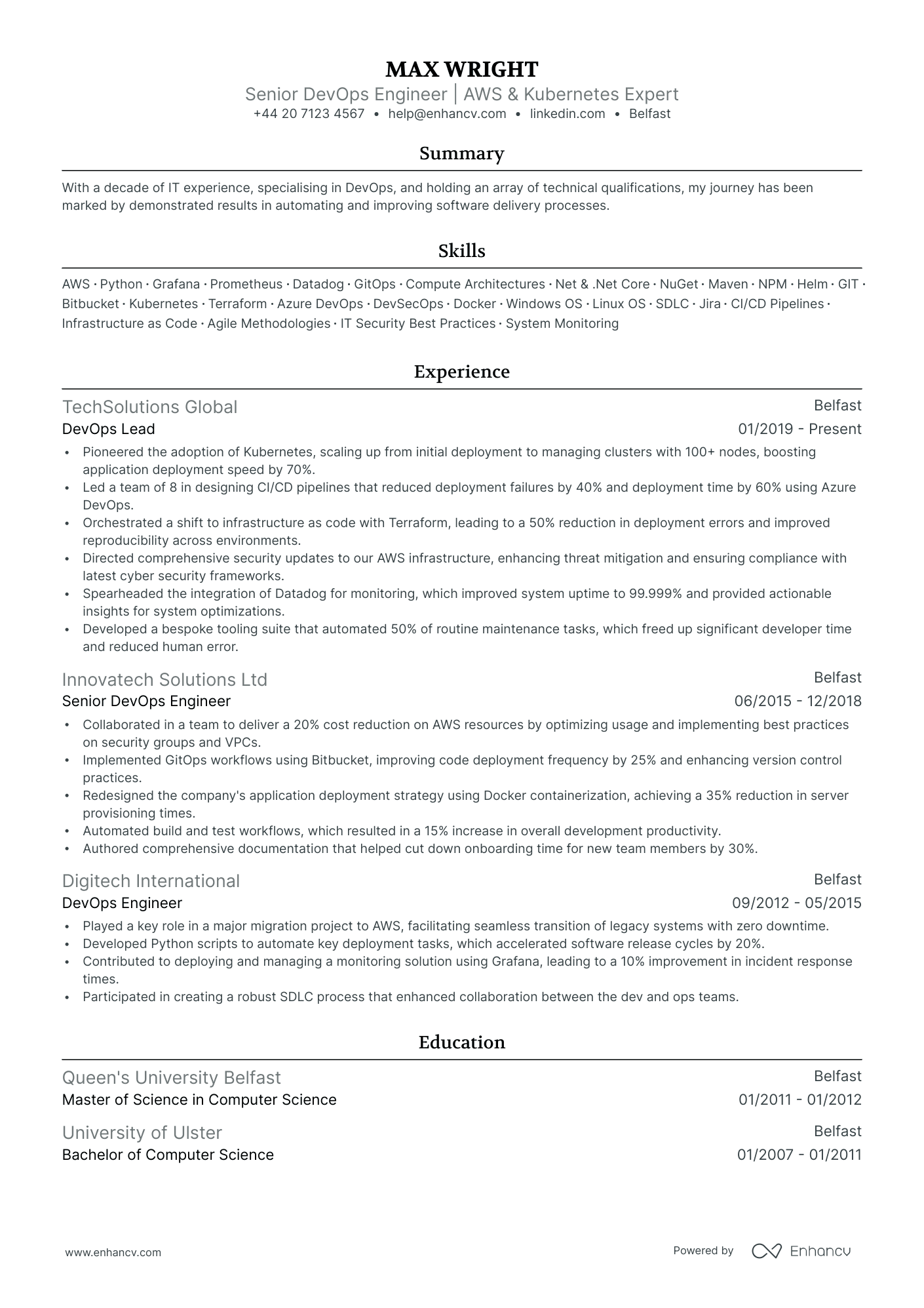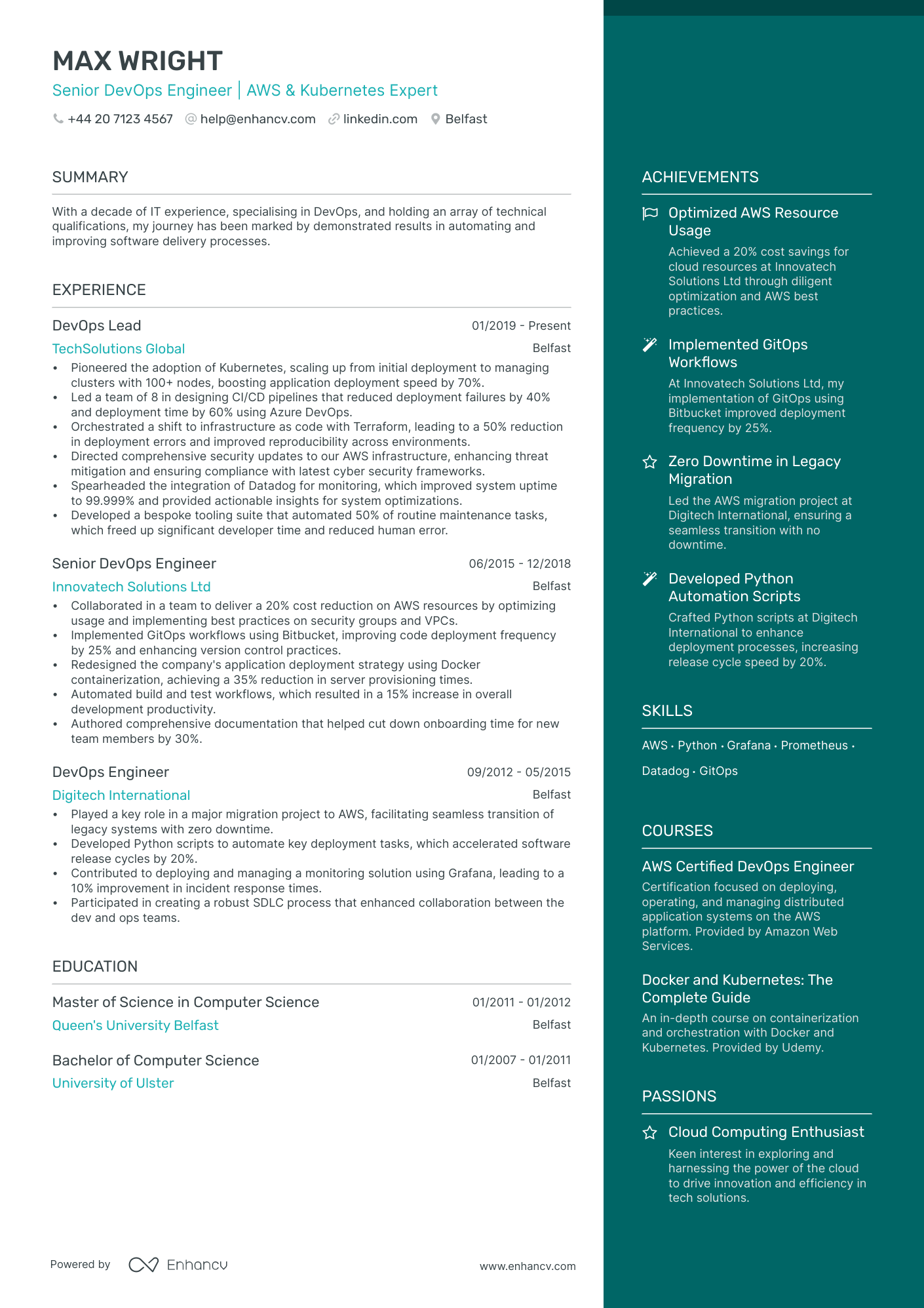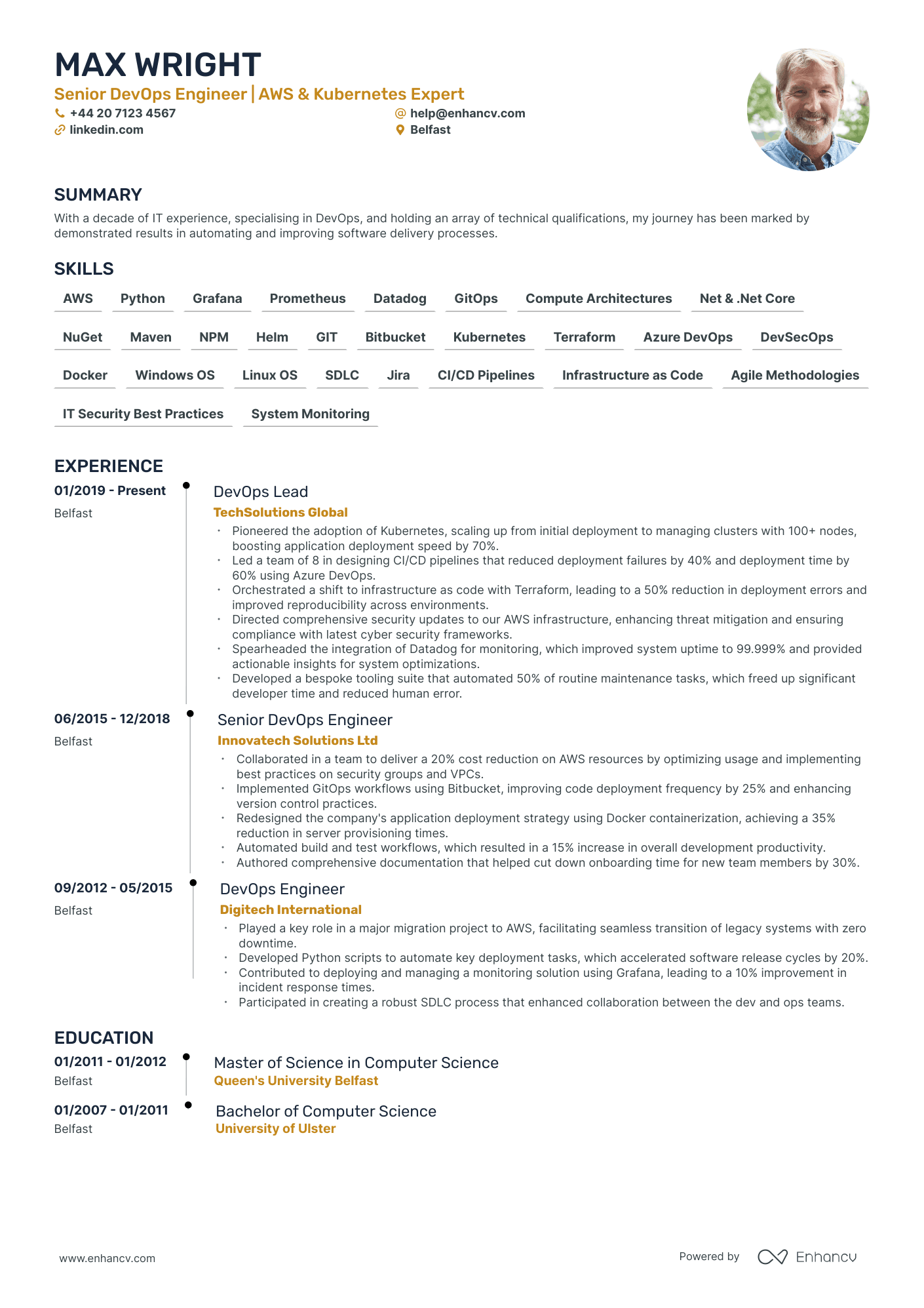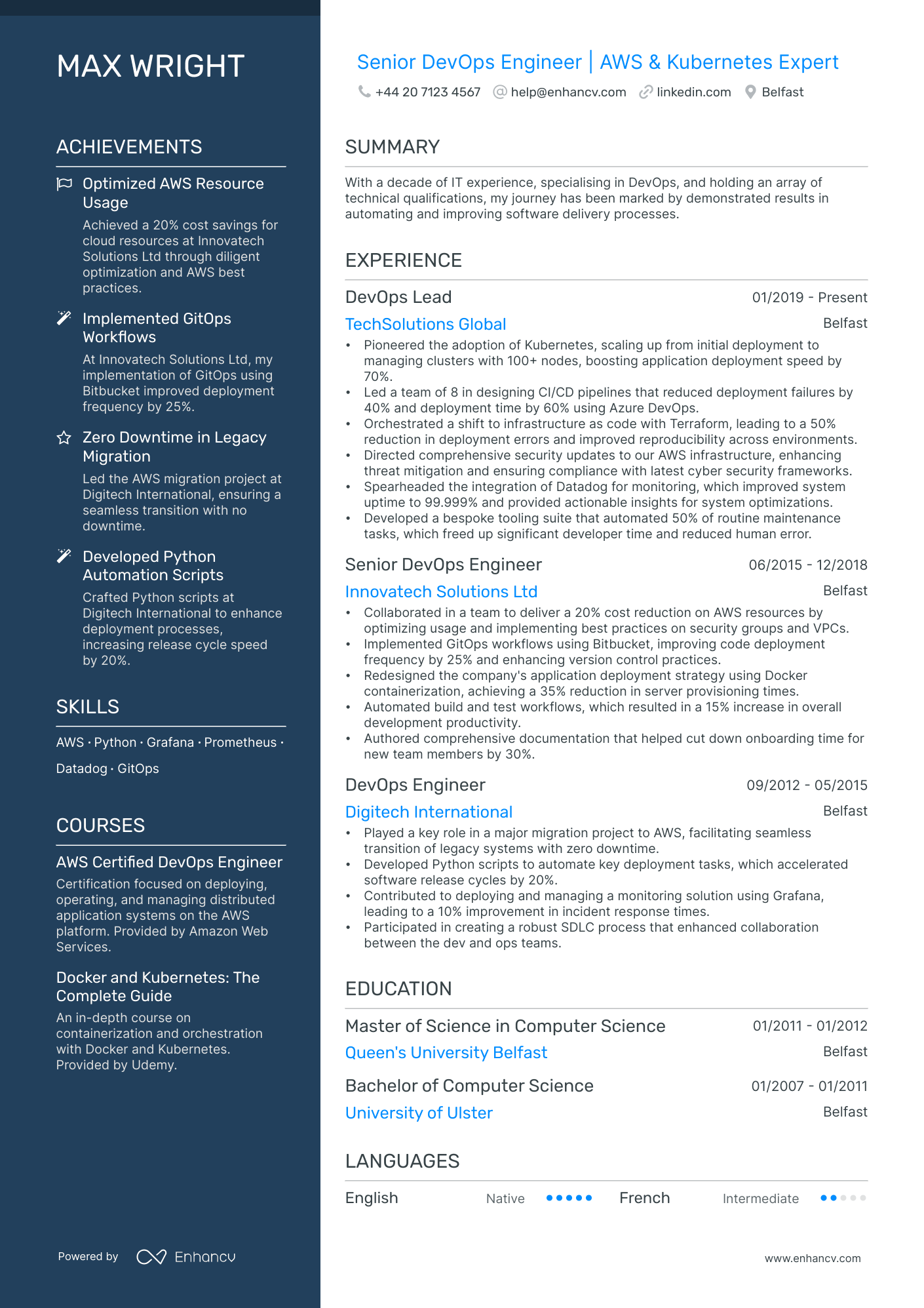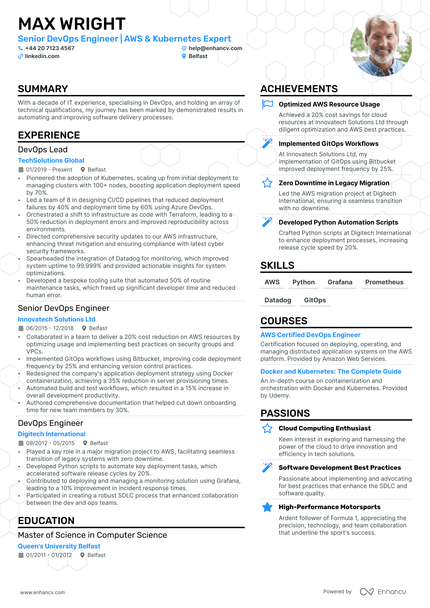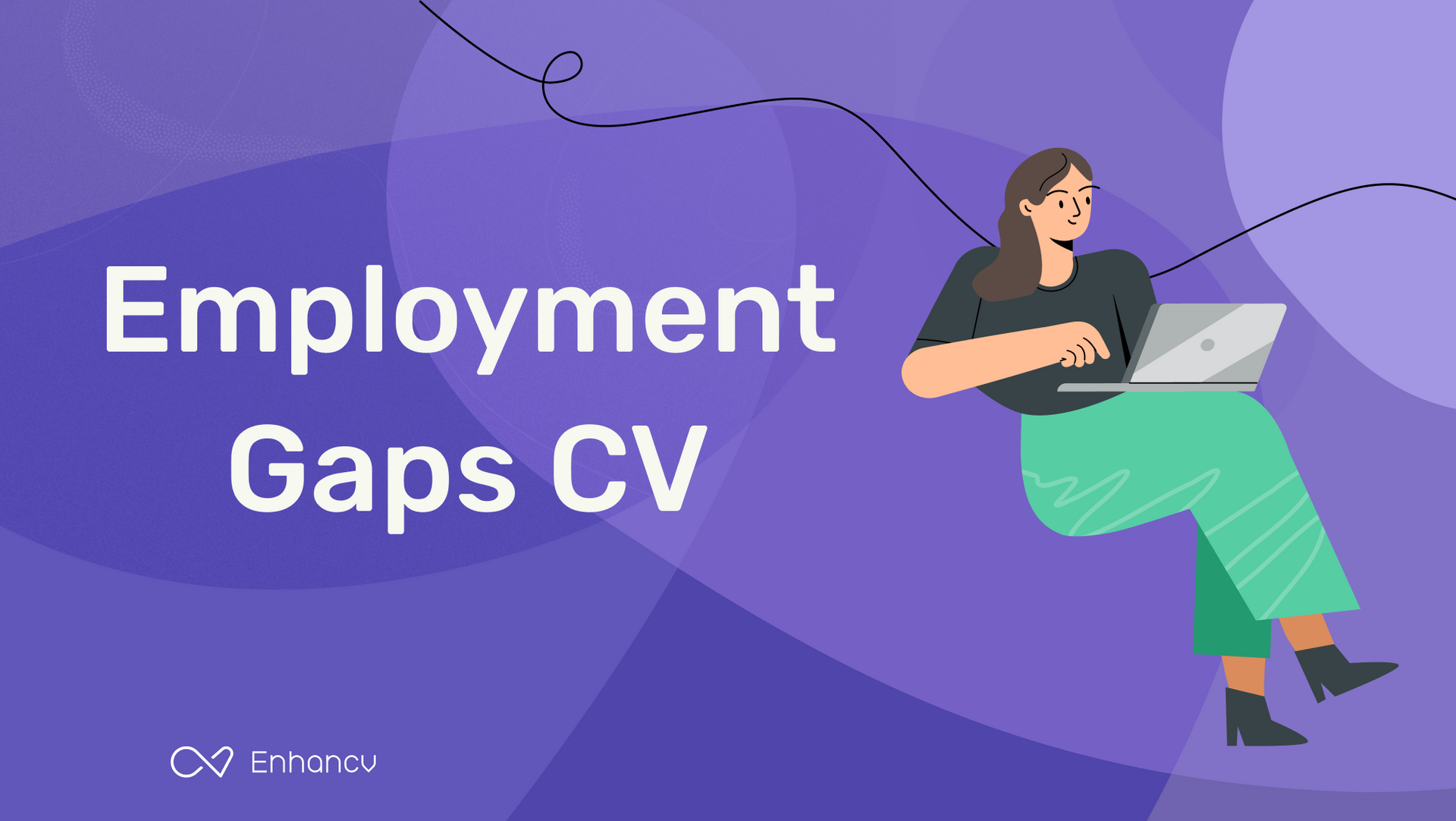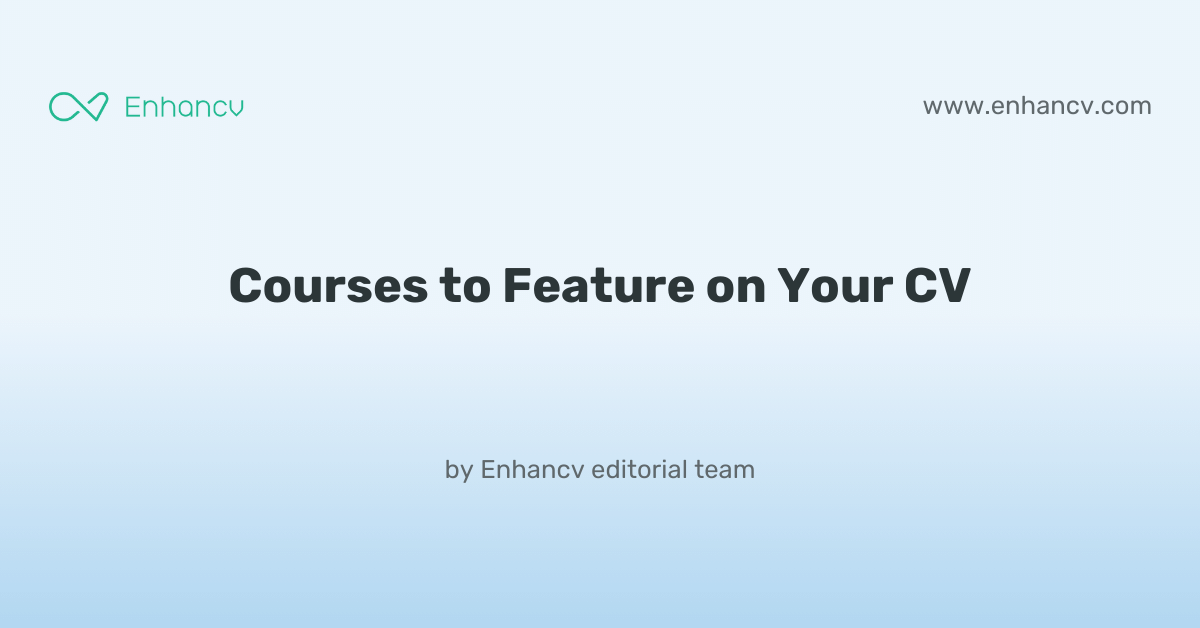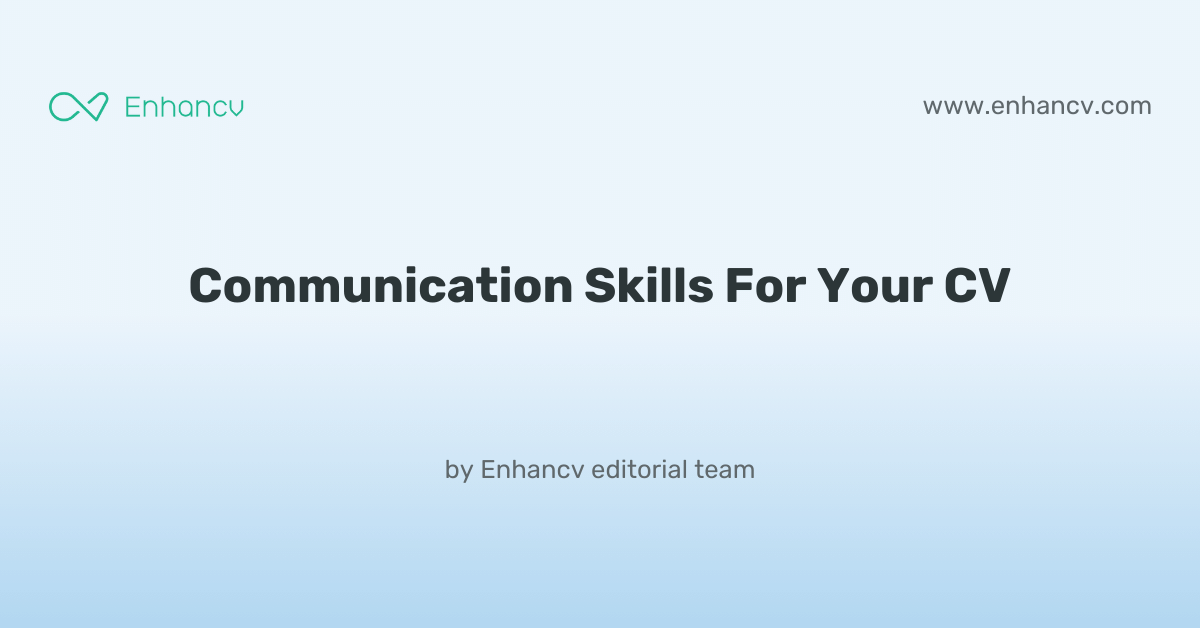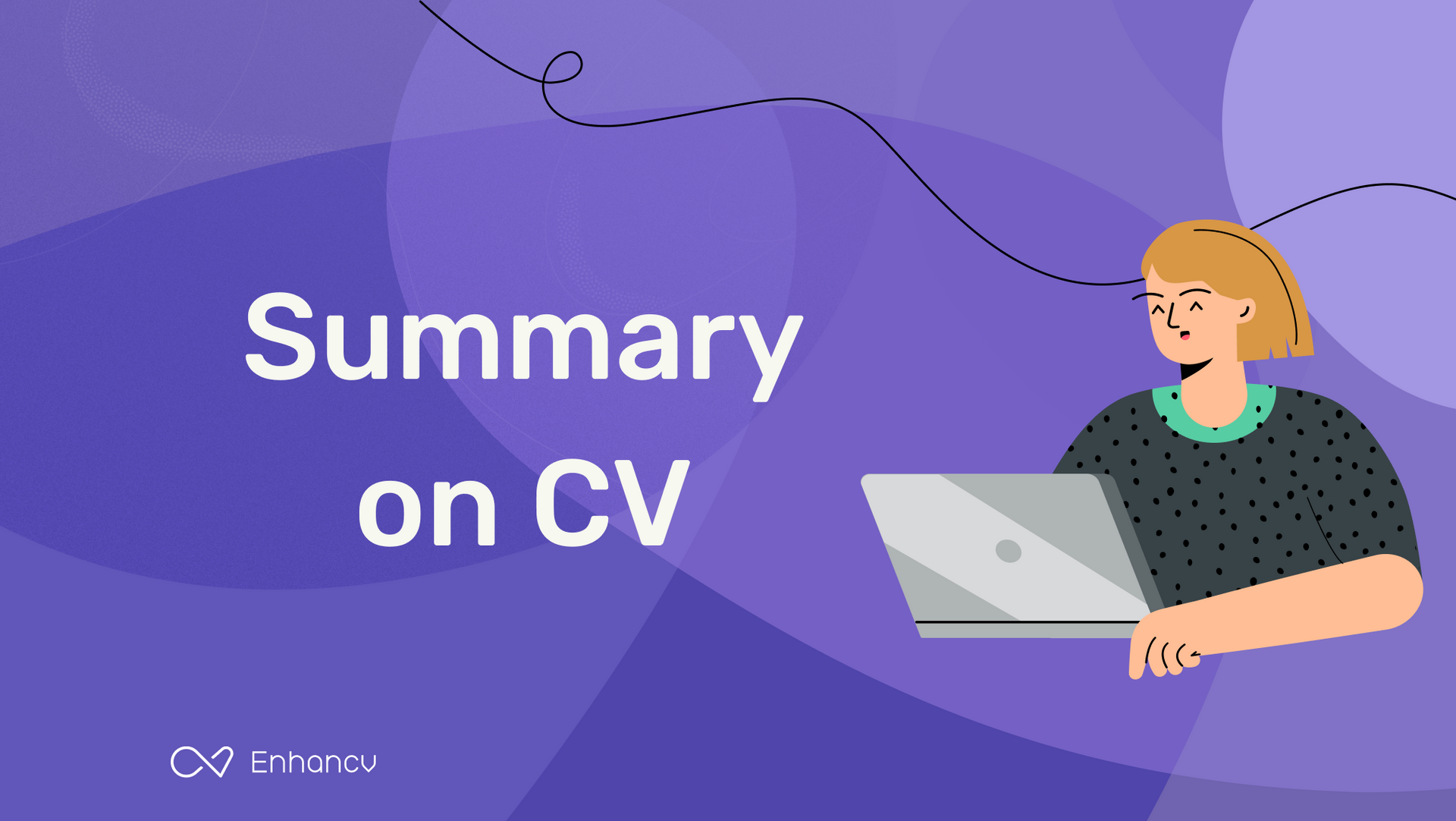One specific CV challenge you may encounter as a DevOps engineer is articulating your diverse set of technical skills and project experiences in a way that stands out to potential employers. Our guide provides targeted advice on structuring your CV, helping you to effectively showcase your expertise and make a memorable impression.
- Applying best practices from real-world examples to ensure your profile always meets recruiters' expectations;
- What to include in your work experience section, apart from your past roles and responsibilities?
- Why are both hard and soft skills important for your application?
- How do you need to format your CV to pass the Applicant Tracker Software (ATS) assessment?
If you're writing your CV for a niche devops engineer role, make sure to get some inspiration from professionals:
Structuring and formatting your devops engineer CV for an excellent first impression
The experts' best advice regarding your CV format is to keep it simple and concise. Recruiters assessing your CV are foremost looking out for candidates who match their ideal job profile. Your white space, borders, and margins. You may still be wondering which format you need to export your CV in. We recommend using the PDF one, as, upon being uploaded, it never alters your information or CV design. Before we move on to the actual content of your devops engineer CV, we'd like to remind you about the Applicant Tracker System (or the ATS). The ATS is a software that is sometimes used to initially assess your profile. Here's what you need to keep in mind about the ATS:- All serif and sans-serif fonts (e.g. Rubik, Volkhov, Exo 2 etc.) are ATS-friendly;
- Many candidates invest in Arial and Times New Roman, so avoid these fonts if you want your application to stand out;
- Both single and double column CVs can be read by the ATS, so it's entirely up to you to select your CV design.
PRO TIP
Incorporate a touch of colour in headers or section breaks, but keep it professional and ensure it doesn’t detract from readability, especially in more conservative industries.
The top sections on a devops engineer CV
- Professional Summary highlights career accomplishments and DevOps expertise.
- Technical Skills showcases specific tools and technologies used in DevOps.
- Professional Experience details projects, roles, and responsibilities in DevOps.
- Certifications and Education confirm qualifications and formal DevOps training.
- Projects and Achievements demonstrate practical DevOps outcomes and successes.
What recruiters value on your CV:
- Emphasise your technical proficiency by detailing your experience with tools and technologies pertinent to DevOps, such as Docker, Kubernetes, Ansible, Terraform, and continuous integration/continuous deployment (CI/CD) pipelines.
- Showcase your coding skills by mentioning your proficiency in scripting languages commonly used in DevOps processes, like Python, Bash, or Ruby, and include examples of automation scripts you’ve developed.
- Highlight your collaborative abilities by describing successful projects where you worked closely with development and operations teams to streamline deployment processes and improve system reliability.
- Illustrate your problem-solving aptitude by providing examples of challenges you have overcome in maintaining high-availability systems or in implementing scalable infrastructure solutions.
- Demonstrate your commitment to continuous learning and staying current with industry best practices by listing relevant certifications, training, or conferences attended, such as AWS Certified DevOps Engineer, Certified Kubernetes Administrator, or attendance at DevOpsDays.
Recommended reads:
Our checklist for the must-have information in your devops engineer CV header
Right at the very top of your devops engineer CV is where you'd find the header section or the space for your contact details, headline, and professional photo. Wondering how to present your the name of the city you live in and the country abbreviation as your address;
- are tailored to the role you're applying for by integrating key job skills and requirements;
- showcase what your unique value is, most often in the form of your most noteworthy accomplishment;
- select your relevant qualifications, skills, or current role to pass the Applicant Tracker System (ATS) assessment. Still not sure how to write your CV headline? Our examples below showcase best practices on creating effective headlines:
Examples of good CV headlines for devops engineer:
- "Lead DevOps Engineer | Cloud Infrastructure Specialist | AWS Certified | Agile Methodologies | 10+ Years' Experience"
- "Senior DevOps Engineer | CI/CD Evangelist | Kubernetes Expert | DevSecOps Principles | 7 Years in Tech"
- "DevOps Engineer | Automation Architect | Python & Go Proficient | Azure Solutions Expert | 5 Years' Expertise"
- "Junior DevOps Engineer | Enthusiast in Continuous Delivery | Docker Practitioner | Git Guru | 2+ Years Professional"
- "Associate DevOps Engineer | Site Reliability Focus | Infrastructure as Code | Certified Scrum Master | 3 Years' Journey"
- "DevOps Team Lead | Scalable Systems Innovator | Red Hat Certified Engineer | Lean Deployment | 8 Years' Mastery"
Opting between a devops engineer CV summary or objective
Within the top one third of your devops engineer CV, you have the opportunity to briefly summarise your best achievements or present your professional goals and dreams. Those two functions are met by either the CV summary or the objective.
- The summary is three-to-five sentences long and should narrate your best successes, while answering key requirements for the role. Select up to three skills which you can feature in your summary. Always aim to present what the actual outcomes were of using your particular skill set. The summary is an excellent choice for more experienced professionals.
- The objective is more focused on showcasing your unique value as a candidate and defining your dreams and ambitions. Think about highlighting how this current opportunity would answer your career vision. Also, about how you could help your potential employers grow. The objective matches the needs of less experienced candidates, who need to prove their skill set and, in particular, their soft skills.
Still not sure about how to write your CV opening statement? Use some best industry examples as inspiration:
CV summaries for a devops engineer job:
- With over 5 years of hands-on experience as a DevOps Engineer, I have developed a proficiency in automation tools like Ansible and Kubernetes, optimised cloud infrastructure on AWS and Azure, and successfully led the migration of legacy systems resulting in a 20% increase in system efficiency.
- Accomplished Software Developer, transitioning into DevOps with 8 years in software design, coding, and deployment. I bring expertise in continuous integration using Jenkins and Docker, a thorough understanding of Linux systems, and a track record of increasing team productivity by 30% through automation practices.
- Ex-Military Systems Analyst now pursuing DevOps, having acquired critical problem-solving skills and a disciplined work ethic over 10 years. I am adept in Python scripting, possess initial exposure to AWS services, and am keen on applying structured approaches to streamline deployment and integration processes in civilian tech environments.
- Distinguished Network Administrator with a decade of experience looking to transition into a DevOps role. My technical acumen includes advanced networking skills, proficiency in build and release management with Git and SVN, coupled with a passion for achieving operational excellence through DevOps methodologies.
- Eager to launch a career in DevOps, I bring a relentless work ethic and a strong foundation in software development practices, including Agile methodologies and version control with Git. I am committed to learning and contributing to continuous delivery and deployment in a dynamic team setting.
- As a recent computer science graduate, I aim to apply my academic knowledge in programming, data structures, and algorithm design to a practical DevOps environment. My objective is to blend theoretical understanding with hands-on practice in CI/CD pipelines and cloud platforms, growing into a proficient DevOps Engineer.
Narrating the details of your devops engineer CV experience section
Perhaps you've heard it time and time again, but, how you present your experience is what matters the most. Your CV experience section - that details your work history alongside your accomplishments - is the space to spotlight your unqiue expertise and talents. So, avoid solely listing your responsibilities, but instead:
- adverts' keywords and integrate those in your experience section;
- Use your CV to detail how you've been promoted in the past by including experience in the reverse chronological order.
Before you start writing your devops engineer CV experience section, dive into some industry-leading examples on how to structure your bullets.
Best practices for your CV's work experience section
- Implemented and maintained CI/CD pipelines using Jenkins, reducing deployment times by 50% and enhancing the feedback loop for the development team.
- Architected and deployed a Docker containerisation strategy that increased application portability and streamlined development to production workflow.
- Utilised Ansible for configuration management and automation of repetitive tasks, improving system consistency and saving over 20 hours of manual work per month.
- Developed a comprehensive monitoring and alerting system with Prometheus and Grafana, leading to a 30% decrease in downtime and quicker incident response.
- Facilitated the transition to a microservices architecture, creating a more scalable and resilient system that improved overall application availability.
- Performed regular system audits and led the effort to maintain compliance with security standards such as ISO 27001, enhancing the company's security posture.
- Optimised cloud infrastructure costs by implementing effective resource management and auto-scaling policies, saving the company over £50,000 annually.
- Collaborated closely with cross-functional development teams to foster a culture of DevOps best practices, increasing deployment frequency and reducing cross-departmental friction.
- Introduced Infrastructure as Code (IaC) using Terraform, which enhanced version control for infrastructure and enabled the safe and predictable deployment of environments.
- Led the implementation and management of CI/CD pipelines using Jenkins, improving deployment frequency by 150%, which propelled product delivery speeds.
- Administered a complex cloud infrastructure on AWS, using Terraform for IaC, which supported a user base growth of 40% without incurring significant additional costs.
- Collaborated with the software development team to optimise system architecture, which enhanced system resilience and uptime by 99.9%.
- Architected and established a Kubernetes orchestration environment that facilitated a smoother scaling strategy for microservices, handling requests peaking at 10k per minute.
- Enhanced security posture by integrating a comprehensive security scanning system within the CI/CD pipeline, reducing vulnerability exposure by 70%.
- Spearheaded a cross-functional initiative to implement IaC with Ansible, leading to a reduction in environment provisioning times from hours to minutes.
- Automated key deployment processes using Chef, resulting in a decrease in deployment-related errors by 60% and allowing for more consistent and reliable deployment cycles.
- Orchestrated a migration of services from a monolithic architecture to microservices, achieving a 50% improvement in application scalability.
- Facilitated a 20% cost reduction by optimising resource allocation through proactive monitoring with tools like Prometheus and Grafana.
- Implemented version control best practices with Git, leading to a more streamlined development process supporting 100+ developers.
- Drove a company-wide adoption of a DevOps culture, supporting collaborative efforts between development and operations teams.
- Reduced system downtime by 30% through meticulous root cause analysis and instituting robust contingency planning protocols.
- Optimized containerization strategies using Docker, yielding a 25% improvement in application load times and resource usage.
- Developed an automated disaster recovery solution that decreased data restoration times by 80%, ensuring business continuity in potential data loss scenarios.
- Guided junior DevOps team members, improving team productivity by 20% through mentorship and efficient task delegation.
- Coordinated the successful migration of a legacy system to a containerized environment using Docker Swarm, enhancing system reliability and reducing hosting costs by 30%.
- Played a pivotal role in the development and maintenance of a resilient and scalable multi-cloud strategy across Azure and GCP, accommodating a 100% increase in service demand.
- Automated system audit processes, which played a critical role in the company passing industry compliance audits with zero non-conformities.
- Pioneered the adoption of serverless technologies within the organisation, resulting in a 40% reduction in operational costs and a significant boost in scalability.
- Instrumental in redesigning the logging infrastructure using the ELK Stack, which provided developers with actionable insights and cut down issue resolution times by 50%.
- Championed a continuous delivery approach to software updates which saw a reduction in the lead time for changes from an average of one month to one week.
- Integrated a proactive monitoring and alerting system with New Relic and PagerDuty that reduced MTTR (Mean Time To Recover) from incidents by 25%.
- Facilitated a seamless migration of over 20 applications to a hybrid cloud environment, which resulted in improved scalability and a 15% cost saving due to optimal resource utilisation.
- Developed a comprehensive backup strategy that ensured zero data loss over a span of 4 years and improved recovery time objectives by 70%.
What to add in your devops engineer CV experience section with no professional experience
If you don't have the standard nine-to-five professional experience, yet are still keen on applying for the job, here's what you can do:
- List any internships, part-time roles, volunteer experience, or basically any work you've done that meets the job requirements and is in the same industry;
- Showcase any project you've done in your free time (even if you completed them with family and friends) that will hint at your experience and skill set;
- Replace the standard, CV experience section with a strengths or achievements one. This will help you spotlight your transferrable skills that apply to the role.
Recommended reads:
PRO TIP
Include examples of how you adapted to new tools, environments, or work cultures, showing your flexibility.
Describing your unique skill set using both hard skills and soft skills
Your devops engineer CV provides you with the perfect opportunity to spotlight your talents, and at the same time - to pass any form of assessment. Focusing on your skill set across different CV sections is the way to go, as this would provide you with an opportunity to quantify your achievements and successes. There's one common, very simple mistake, which candidates tend to make at this stage. Short on time, they tend to hurry and mess up the spelling of some of the key technologies, skills, and keywords. Copy and paste the particular skill directly from the job requirement to your CV to pass the Applicant Tracker System (ATS) assessment. Now, your CV skills are divided into:
- Technical or hard skills, describing your comfort level with technologies (software and hardware). List your aptitude by curating your certifications, on the work success in the experience section, and technical projects. Use the dedicated skills section to provide recruiters with up to twelve technologies, that match the job requirements, and you're capable of using.
- People or soft skills provide you with an excellent background to communicate, work within a team, solve problems. Don't just copy-paste that you're a "leader" or excel at "analysis". Instead, provide tangible metrics that define your success inusing the particular skill within the strengths, achievements, summary/ objective sections.
Top skills for your devops engineer CV:
Linux/Unix Administration
Continuous Integration/Continuous Deployment (CI/CD)
Infrastructure as Code (IaC)
Containerization with Docker
Orchestration with Kubernetes
Cloud Services (AWS, Azure, GCP)
Scripting (Bash, Python, etc.)
Version Control with Git
Configuration Management (Ansible, Puppet, Chef)
Monitoring and Logging Tools (Prometheus, Grafana, ELK Stack)
Problem-Solving Ability
Collaboration and Teamwork
Adaptability
Effective Communication
Attention to Detail
Time Management
Proactivity
Continuous Learning
Critical Thinking
Stress Resilience
PRO TIP
Focus on describing skills in the context of the outcomes they’ve helped you achieve, linking them directly to tangible results or successes in your career.
Your university degree and certificates: an integral part of your devops engineer CV
Let's take you back to your uni days and decide what information will be relevant for your devops engineer CV. Once more, when discussing your higher education, select only information that is pertinent to the job (e.g. degrees and projects in the same industry, etc.). Ultimately, you should:
- List only your higher education degrees, alongside start and graduation dates, and the university name;
- Include that you obtained a first degree for diplomas that are relevant to the role, and you believe will impress recruiters;
- Showcase relevant coursework, projects, or publications, if you happen to have less experience or will need to fill in gaps in your professional history.
PRO TIP
Use mini case studies or success stories in your CV to demonstrate how your skills have positively impacted previous roles or projects.
Recommended reads:
Key takeaways
What matters most in your devops engineer CV-writing process is for you to create a personalised application. One that matches the role and also showcases your unique qualities and talents.
- Use the format to supplement the actual content, to stand out, and to ensure your CV experience is easy to comprehend and follows a logic;
- Invest time in building a succinct CV top one third. One that includes a header (with your contact details and headline), a summary or an objective statement (select the one that best fits your experience), and - potentially - a dedicated skills section or achievements (to fit both hard skills and soft skills requirements);
- Prioritise your most relevant (and senior) experience closer to the top of your CV. Always ensure you're following the "power verb, skill, and achievement" format for your bullets;
- Integrate both your technical and communication background across different sections of your CV to meet the job requirements;
- List your relevant education and certificates to fill in gaps in your CV history and prove to recrutiers you have relevant technical know-how.
